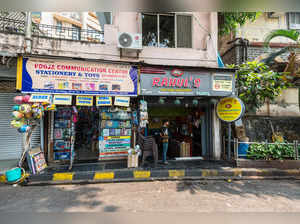 iStock
iStock ET Online
ET OnlineRegister for the ET MSME Day 2024 here.
The Economic Times (ET): What are the current challenges faced by MSMEs in India and how are you leveraging the distribution-as-a-service (DaaS) model to address challenges?
Anand Kumar Bajaj (AKB): MSMEs in India struggle due to limited access to microloans, microinsurance and other banking services, especially in rural and semi-urban areas. Our distribution-as-a-service model is designed to directly address these issues. Through our network of kirana stores, medical shops and other local retailers, we empower these businesses to become digital touchpoints. We call these local retail partners ‘digital pradhans’. This approach allows them to offer sachetised financial products and services directly to customers, bridging the gap left by traditional banking infrastructure.
By partnering with insurers, lenders and bankers, we bring these services directly to the last mile, helping them to access previously inaccessible markets and eliminating the need for them to build separate infrastructure or manage additional manpower. This not only reduces costs of our partners but also builds trust within the community through the familiar local retailers. Our model ensures that MSMEs can access the financial tools they need to thrive, while also enabling retailers to expand their service offerings and increase footfalls to their stores.

AKB: PayNearby works as a banking correspondent, as a loan service provider, and as an insurance POS terminal, where my retailer (a kirana store) in that locality can cater to a local community. Our digitisation and modernisation initiatives elevate local retailers to compete effectively with larger e-commerce platforms.
Additionally, we ensure market access by optimising sourcing and providing stock and transit insurance, thereby securing business operations for MSMEs. In essence, our approach builds economic growth and endurance among local retailers, reinforcing their role as essential drivers of India’s retail ecosystem.
ONDC is also similarly facilitating a direct brand connection, promoting efficient market dynamics. This creates a direct connection of the manufacturers and the retailers on to one platform, reducing the intermittent layers involved in the process. It's a 2-way transmission protocol, an intelligent neural network, which can connect both sides of the market dynamics.
The open network platforms are expanding to include mutual funds, insurance and lending, to reach the last mile without fixed costs for financial product manufacturers. Direct partnerships facilitate this reach and lower costs. With the OCEN framework and account aggregator platform, lenders can now offer small loans of Rs 15,000-25,000 easily by using Aadhaar to access bank details, bypassing traditional paperwork. This innovation promotes supply chain finance for MSMEs, enabling seamless engagement with a platform ‘Prayaas by SIDBI’ that we are currently working on. Here a documentary credit will be available easily as a supply chain finance to the MSMEs.
ET: What is the payment model and how much revenue does a retailer earn by partnering with PayNearby?
AKB: The idea is to provide banking and financial services to the last mile at no additional cost, making bankers and insurers willing to pay for the services facilitated by the retailers. Our model ensures we earn when our suppliers earn, and we pay our distribution partners immediately. Retailers partnering with PayNearby can earn revenue through commissions on various financial transactions facilitated through our platform. The earnings vary based on the services provided and the volume of transactions. A retailer can earn Rs 250 to Rs 15,000 per month. The revenue depends on factors such as the demographic profile and the demand for financial services such as microloans, microinsurance and banking transactions in their locality. Additionally, partnering with PayNearby brings an increase in footfall, with approximately 50 new customer visits per month, which can boost the retailer's earnings from other products offered at their stores.
ET: How many retailers do you have in your network? How many more do you plan to onboard in 1-2 years?
AKB: Currently, we have 1.2 million retailers activated and approved on our platform, with approximately 4 lakh monthly active retail touchpoints. Our goal is ambitious — to onboard 5 million touchpoints in the next 1-2 years. With a strong base of 1 crore downloads on Android Play Store, we are well-positioned to achieve this target. We are focusing on enabling and empowering these touchpoints, which include individual self-help groups and trading partners, through training and capacity-building initiatives.
ET: Share your growth plans for the next few years.
AKB: Our growth plans are centered around expanding our reach and impact across Bharat. We are focused on extending our banking programme, aiming to scale up UPI adoption to the next 300 million. We envision enabling marginalised individuals to become digitally savvy, thus building greater financial inclusion and empowerment. Additionally, we are preparing for the ultimate goal of going public, as we believe that public participation platforms can enhance transparency, visibility and accountability. This will allow us to further engage and collaborate with the community as co-creators of our shared success.
Read More News on
(Catch all the Business News, Breaking News, Union Budget 2024 Events and Latest News Updates on The Economic Times.)
Subscribe to The Economic Times Prime and read the ET ePaper online.
Read More News on
(Catch all the Business News, Breaking News, Union Budget 2024 Events and Latest News Updates on The Economic Times.)
Subscribe to The Economic Times Prime and read the ET ePaper online.











 Get Unlimited Access to The Economic Times
Get Unlimited Access to The Economic Times
